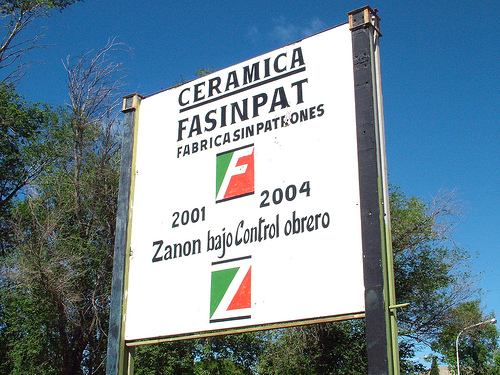I recently finished Robert Reich's Supercapitalism: The Transformation of Business, Democracy, and Everyday Life. Throughout the book, he describes the way in which capitalism evolved from the "Not Quite Golden Age" of the mid-20th century to today's "Supercapitalism."
Reich describes the "Not Quite Golden Age" as follows:
"The central features of of American democratic capitalism during the Not Quite Golden Age fit together in a remarkably coherent system, merging economics and politics. America's largest corporations would plan and implement the production of a large volume of goods, gaining significant economies of scale, and thereby reducing the cost of producing each unit. By coordinating explicitly or implicitly with the handful of other giant companies in the same industry, they could set prices high enough to ensure substantial profits....Democratic capitalism of this era involved a complex and continuous set of negotiations - sometimes directly between key players, like big business and big labor; sometimes indirectly within regulatory agencies and legislatures. There were several important consequences: first, large economies of scale, generating high productivity and hence significant profits; second, tens of millions of steady jobs; third, a wide distribution of profits (downward to the blue-collar workers and outward to smaller communities, farmers, and other constituents); fourth, millions of consumers who used this largesse to purchase the goods and services produced in ever larger quantities, thereby stabilizing the economy for large-scale production. The result was a large and growing middle class across the country that stabilized the political system. It was full circle" (46-47).
During this period, innovation and efficiency were both lacking, and stockholders were "passive and functionless figures," according to economist John Kenneth Galbraith. As Reich's title for the era suggests, not everything was "golden." The US government put down communist rebellions in places where American corporations had a stake, and inequality and oppression were still rampant.
Our system began changing as the Cold War progressed.
"The road to supercapitalism began with technologies that emerged from the Cold War - containers, cargo ships and planes, fiber-optics cables, and satellite communications systems. They allowed the creation of global supply chains. They also spurred the commercial development of computers and software that could produce items at a low cost without large scale, and eventually distributive services over the Internet. All this shattered the old system of large-scale production and dramatically increased competition" (86-87).
Ultimately, because of military research undertaken to keep the United States ahead in the Cold War, technologies and innovations made the economy more global. Because of the new demands and new markets that emerged, more corporations sprung up and competition intensified.
Reich goes on to describe that most of us are "of two minds" in regard to the consequences of this. We are excited about the successes of the economy, the inventions and innovations it has created, and the growth of the stock market. However, we are also weary of the widening inequality, job instability, destruction of the environment, and disregard for human rights in the production of many products. Reich says that we are of these two irreconcilable viewpoints because we have two roles in society: we are consumers and investors, who praise supercapitalism, and we are citizens, who are dissatisfied with it. In the Not Quite Golden Age, the balance achieved between these two sides heavily favored the citizen in us, but now, there is no balance:
"Our desires as consumers and investors usually win out because our values as citizens have virtually no effective means of expression - other than in heated rhetoric directed at the wrong targets" (89).
He uses the example of Wal-Mart to illustrate this: Wal-Mart is notorious for guaranteeing extremely low prices for its consumers. It pressures its suppliers to sell goods for less, and because Wal-Mart has so much bargaining power, the suppliers will listen because Wal-Mart will just get its goods from somewhere else if they don't. Because of this, suppliers "squeeze the wages and benefits of the millions of people who work for them in the United States and abroad" (91). Wal-Mart does the same to keep prices low. As consumers and investors, we're okay with this because we enjoy paying lower prices for the same goods, and the returns on Wal-Mart's stock are good. (Because of the huge amount of competition - a feature central to supercapitalism - Wal-Mart has to keep its prices low and returns high, otherwise consumers and investors would go elsewhere.) However, as citizens, we are less enthusiastic about this because of the negative impact it has on the workforce and communities.
The only reason for this is because we are complicit.
"[The] issues of economic security, social security, community, our shared environment, and common decency were central to democratic capitalism as we knew it in the Not Quite Golden Age. They were - and still are - concerns to us in our capacity as citizens. But as power has shifted to us as consumers and investors, these issues have been eclipsed. We've entered into a Faustian bargain. Today's economy can give us great deals largely because it punishes us in other ways. We blame big corporations, but we've mostly made this bargain with ourselves" (99).
He later continues
"The main culprit has not been corporate greed or CEO insensitivity but rather the increasing pressure on companies from consumers like you and me who want better deals, and from investors like us who want better returns" (103).
The consumer-investor side has continued to win because markets are able to respond efficiently to individual desires but fail at helping to achieve collective goals. We are at fault as citizens because we have allowed the negative practices of corporations to proliferate. We have failed to pressure lawmakers to pass laws limiting corporations significantly (as Reich later points out, politicians make statements condemning the practices of corporations all the time, but these are seldom followed by policy changes). Not only that, but we have lost faith in our democracy because of the massive influence corporations have (which we have also allowed to take hold). Americans have lost their confidence in our democracy, which Reich sees as the result of the influence of money in politics.
"Money is a by-product of the very feature of supercapitalism that has led to its economic triumph - intensifying competition among firms for consumers and investors" (131).
The competition of the business world has spilled over into our democracy as corporations hope to gain a competitive advantage through public policy. Instead of catering to the demands of citizens, lawmakers are responsive to corporations who spend large amounts of money (to them, a tiny portion of their total revenue) on influencing these politicians through campaign financing and lobbying. The voice of the citizen has been drowned out by the wallet of the corporation. Legal battles and partisan issues in Congress are not fought in the name of citizen interest groups, but corporate competitive advantage. "The result," Reich says, "is a broader form of corruption - the corruption of knowledge" (158). For example, the food industry financed researchers to debunk prior research which concluded that childhood obesity leads to adult health problems, and that weight gain has a direct relationship to the consumption of sugar and fatty foods. Exxon "distributed $2.9 million to thirty-nine interest groups that would raise doubts about climate change" (160), which, according to the British Royal Society, created a "false sense... that there is a two-sided debate going on in the scientific community" about the issue.
Though we have an immense say as consumers and investors, our voices as citizens are drowned out.
"Supercapitalism has spilled over into politics and engulfed democracy" (164)."The major parties are too dependent on corporate funding to risk offending any significant number of companies on Wall Street" (165).
Reich is hopeful about our ability to fashion a system that is more democratic, in which corporations are truly held responsible for their actions. He makes the distinction between today's illusion of "corporate social responsibility" and true responsibility, stating that corporations do not have moral obligations - only individuals do. Furthermore, any "corporate social responsibility", which comes in the form of employing more humane practices to slaughter meat or produce clothing, signing codes of conduct promising good behavior, being more environmentally friendly, etc., is only done as a public relations gimmick to respond to consumer demands, increase revenues, and gain a competitive edge. For example, when General Mills started using whole grains in their cereals, it was not "because these firms became more socially virtuous but because consumers had become more conscious about their own health" (172). Although corporations may sometimes pursue altruistic or moral goals, these are ultimately in response to investors and customers, not to its employees, communities, or society as a whole, and are unlikely to establish new norms of corporate conduct. Reich sums this up by saying:
"Corporations do some good deeds but corporate thank-you rituals mislead the public into believing companies do these things out of selflessness - indeed, that there is a 'self' there deserving of commendation in the first place. But there is no corporate selflessness, and there is no corporate self. In supercapitalism, companies exist only to serve consumers and thereby make money for investors. This is how they serve the public" (207).
The book is concluded by Reich's urging political reforms demanded by all citizens. This should come from understanding truths about our current economic system (the current rules of the game). He states that "if we want [corporations] to play differently, we have to change the rules" (214). The only social responsibility of corporations should be keeping our democracy intact. Additionally, he argues that people need to learn that corporations are not people. Corporations should not have to pay income taxes; only shareholders should. Corporations should not be held liable for the actions of their CEOs, as this hurts innocent workers. Consumers, investors, executives, and workers have a right to advance their interest in a democracy - corporations don't. The last line of the book echoes the necessity of awareness of these truths: "The first step, which is often the hardest, is to get our thinking straight" (225).
---
I see everything Reich writes about as a snowball. Because people are not thinking straight, as he writes in the last line of the book, and are even corrupted into believing that corporations are people, they allow corporations to influence politics and expect them to uphold some moral code (the fulfillment of a "corporate social responsibility" is seen as having such a code). Because of the dwindling citizen in us individually, and also because of the exorbitant amounts of money corporations have, we allow corporations to fulfill the duties of citizens and have an active role in our democracy. It is not only that there is a lack of balance between the consumer/investor and the citizen in us; the consumer/investor has all but taken over.
Reich himself admits that "political reforms cannot be achieved as long as public officials and legislators are dependent on the very corporations whose influence is to be limited. The system cannot repair itself from the inside" (211). Because of this, I doubt that radical political reforms are even plausible - let alone enough to change the role of corporations in our democracy and our lives. I dare to say that we have reached a point of no return, and the only way to create meaningful change is not via regulation, but fundamentally changing the system itself.



